Chainsaws offer consistent sales for a variety of customers, including landowners, landscapers, tree services and others. Keep your customers safe and build dealership loyalty by recommending accessories and safety gear.
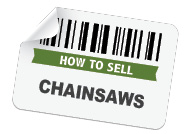
Regardless of where you’re located or what time of year it is, someone in your area is likely buying chainsaws. Loggers, wood stove owners, landscape and tree trimming companies and many small acreage owners are prospects for saws. Every time a chainsaw is sold, there’s also a need for service and safety gear, bars, chains and oil to keep them running. Nationwide, new saw sales are relatively flat, but if a tornado, ice storm or hurricane moves through … ka-ching! It’s money in the bank if you offer chainsaws.
Sorting Through Models
Keenan Mize of Longview Lawn & Garden in Longview, Texas, is a second-generation owner that offers Echo and Stihl chainsaws as well as Scag, Cub Cadet and Snapper lawn equipment. He says the most important part of selling a saw is to determine what the customer needs by asking, “What are you cutting?”
Most manufacturers offer a variety of models in many different price ranges, and Mize says it’s critical to find out how a saw will be used. “The number one thing we want to do is get the right size of product for that person and make sure they’re going to be safe when they use it. We don’t want to oversell a saw, but obviously we don’t want to undersell them a product for what their needs are. If you get somebody that’s cutting firewood, I recommend starting right in the middle with a saw that’s going to be able to cut some pretty good-sized stuff, but not hurt their back trying to operate it,” he says.
Mize’s mix of clients is 60% farm and ranch customers, who generally burn firewood, 20% professional tree cutters and 20% homeowners. Homeowners require extra attention during the sales process. “There are people who come in and don’t know anything about chainsaws. You’re almost scared to death to sell them one, but they’re the customer and they want to spend the money. They want models that are easy to crank and use. My biggest thing is I want to make sure they’re buying something that’s going to be safe for them,” he says.
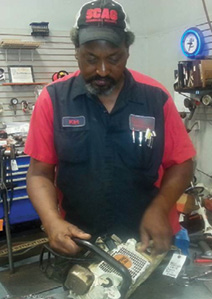
Technician Kirt Pegues repairs an older saw at Longview Lawn & Garden, Longview, Texas. Experienced, factory trained service technicians can help build customer loyalty and downstream revenue.
Mize doesn’t mind the extra effort it takes to assist these customers. “Even though we’re spending a little bit more time with that homeowner, if we take the time, he’s going to think about us first when he needs something besides a saw,” he says.
Those who use chainsaws for their livelihood don’t require much assistance when selecting a saw. “The professional tree cutters know what they’re looking for and there’s not a whole lot of selling technique to them. Most of the guys in the middle — farmers, ranchers and people cutting firewood — usually they already have some experience with chainsaws. They’re going to have a better idea of what size they’ll need for their application and, typically, 18-20-inch saws will work for them.”
Both groups yield substantial downstream revenue from parts sales, Mize says.
Regardless of the end customer, in order to ensure profit when selling chainsaws, a dealer must follow the ordering programs of their supplier. “It’s important to know the policies of the distributor or manufacturer as it relates to freight. You have to buy product to meet their freight minimums. Otherwise, if you order 1 or 2 units at a time, the freight will eat up your profit.” For example, one of Mize’s suppliers offers free freight on an order of 12 units and he consistently meets that minimum.
Mize says he’s seen the reliability gap between chainsaws widen in recent years with the “name brand” saws getting better, while the lower-priced products produced for box stores are dropping in quality and having parts availability issues. He says anyone who wants to start offering chainsaws needs to find a supplier of quality products and offer excellent parts and service support. They also need to be ready to sell and support customers when bad weather hits.
“We had a really bad ice storm in 2000. Tree limbs fell and everybody around here lost power. We were doing business with flashlights and ink pens and our distributors loaded up truckloads of saws for us and we were basically selling out of a truck. We were here selling, because ‘business is business,’ but we were also here for our community. It was certainly not something I was trying to take advantage of, but that’s why we sell chainsaws, for any type of situation like that. We moved to a new facility about 2 years ago and I installed a backup generator system, so if something like that happens again, we’re full blast ready for it,” Mize says.
“When fuel prices spike, everyone goes back to burning firewood…”
Ensuring Profitability
CJ Motor Sports in Boonville, N.Y., is a dealer for Husqvarna chainsaws and outdoor equipment as well as Can-Am, Ski-Doo and Kawasaki recreational products. General Manager Aaron Bourgeois says the dealership’s parent company opened over 35 years ago when his father, grandfather and uncle ordered 7 chainsaws and offered them for sale in a garage. That business, CJ Logging, now has locations in Boonville and Little Valley, N.Y., and Allenwood, Pa., and sells specialty logging equipment.
Bourgeois agrees the first step in selling a chainsaw is figuring out what the customer needs and the next step is recommending safety apparel. “When you’re dealing with the ‘weekend warriors’ who trim limbs and cut a little firewood, they really don’t know all the safety aspects of the saw. It can be dangerous for them to run it. You have to do your best job to try to protect them in any way possible. That also gives you another revenue stream when someone buying a $250 saw also finds out they need eye and ear protection, chaps and these types of things. The margin on those items is always better than on the saw itself,” he says.
Bourgeois is in a highly competitive chainsaw market, but he maintains about a 15% margin on saws for tree services and logging. He battles chain retailers on smaller items. “I guess the biggest problem you have is customers have the perception that if they go to a big box store, they can automatically buy things cheaper than they can at a dealership, which isn’t the case.” Still, Bourgeois says 20% margins are attainable on homeowner-type saws, with safety accessories and apparel in the mid 30-40% range.
He says many of his commercial customers do their own maintenance. However, homeowners and rural lifestylers offer service opportunities, especially those who don’t know that small engines can be harmed if they are stored with fuel containing ethanol. “The really nice thing about having a solid service department is when a customer does purchase something from Lowe’s or Tractor Supply, they have to have it worked on somewhere. By offering them a good service experience, you’re promoting your business and it’s also a chance to show them all the models the box stores don’t carry and that the prices on models they do carry are comparable at our dealership,” Bourgeois says
Stocking all the different models does offer a challenge when planning inventory. “We have found what kind of models sell in our area and what models don’t. I would say our most popular saw is above the homeowner status, a professional grade product, and I like to carry at least 15-20 of that model in stock. Once you get down to the homeowner saws, 4-5 may be enough,” he says.
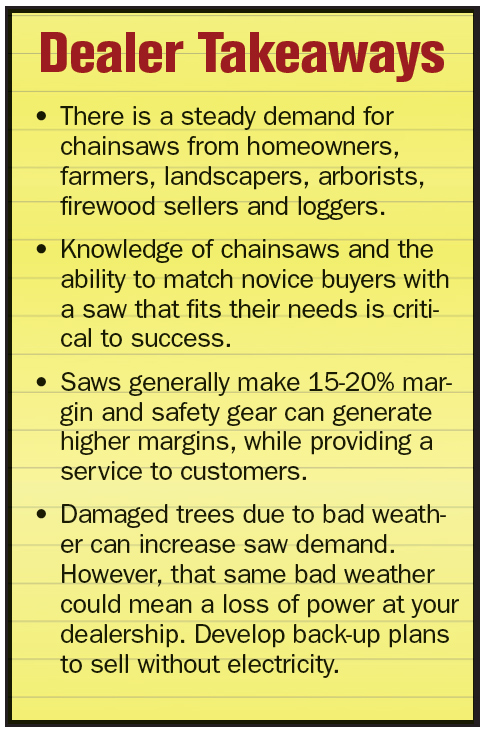
Bourgeois says his total inventory is around 80-100 units at all times and there’s no interest paid on saws sold within a year. “You definitely need to make sure you’re selling the oldest machines first, because once the interest hits, it’s at about 15%,” he says.
Supporting Commercial Customers
Bourgeois says commercial customers, such as loggers, don’t demand much time from his sales team. “Out of the 25 available saw models, there are only about two main saws that these guys use. They walk in and they know what they want. They’re price shopping and that’s where the margins are the skinniest. Just because you’re $10 or $15 higher than the other guy, though, doesn’t mean they won’t buy it from you, as long as you take care of them,” he says.
Don’t look for big sales of saws to loggers, even if you’re in a heavily forested area. Bourgeois says economics have eliminated a lot of small crews who used to fell trees. Today’s loggers have self-propelled equipment that can drop trees much more productively, so they use chainsaws only for very large trees and clean up. “What’s been making up for that in the last 5 years has been people in the firewood market and tree services. When fuel prices spike, everyone goes back to burning firewood and we’re seeing tree services popping up all over the place. That’s the majority of our sales between those two customers,” he says.
Bourgeois sees challenges ahead for traditional gas-powered chainsaw sales across the market segments due to ethanol fuel issues — and opportunities for battery-powered saws. Battery technology has improved, and manufacturers have introduced battery-powered saws powerful enough for municipalities and tree service companies to consider purchasing.
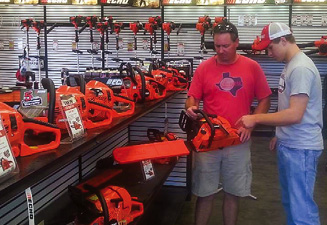
Nathan Mize (right) of Longview Lawn & Garden, Longview, Texas, helps a customer choose the best saw and explains chainsaw operation and safety.
Photo Courtesy of Shores Mower
Successfully Using Social Media
Amy Vogt is the owner of Shores Mower Repair in Edgewater, Fla. The dealership sells Grasshopper and Encore lawn products and Efco chainsaws and hand-held power equipment. Carrying some lesser known brands has forced the dealership to put a lot of effort into brand awareness, much of it through social media. “We have pushed the product out there so it’s visible to people. We’ve used Facebook, LinkedIn, Twitter and Instagram and I’ve even advertised on Craigslist. We’ve had results from all of it,” Vogt says.
Twitter has been especially successful. “I’ve actually gotten a lot of people from not just our immediate area. It’s helped us expand throughout our county and surrounding counties and we’ve picked up a lot of customers that way. Instagram gets pictures of your product out and people ‘like’ it and start sharing them around,” she says.
Social media posts are free, but Vogt does invest in advertising on Facebook. “It doesn’t cost a lot, like $20 for 5 days. You can pick the areas you want to be in and the demographics. You can break it down into ages and people’s interests and it actually comes up on their Facebook page. I’ve had over 5,000 people see one ad within 3 days,” she says.
Many dealers are becoming more proactive on social media, but may struggle with developing relevant and interesting posts. Vogt relies heavily on manufacturers for information. “They offer clear images that are professionally done and I use them. Some people don’t want to put the prices on their equipment, but I do and I push warranty information because Efco has a 5-year residential or 2-year commercial warranty,” she says.
Vogt has found Craigslist to be a great place to sell products, even new saws. “Because some new products are almost the same price as used saws, why not put it out there? And branding is a huge thing. You want people to keep seeing your name.” She says many times customers begin the shopping process on Craigslist, then visit their website and eventually end up in the store. All of the social media efforts build upon each other and enhance the name recognition of the dealership.
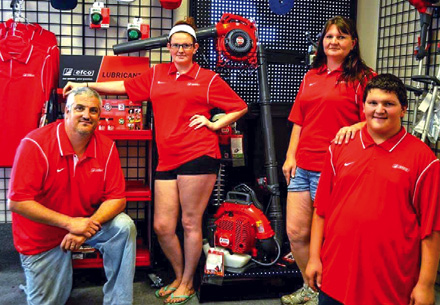
George (left), Ashly, Amy and Matthew Vogt (right) provide chainsaws, service and accessories to east central Florida customers at their dealership, Shores Mower Repair in Edgewater, Fla.
Photo Courtesy of Shores Mower
Vogt’s service area can be hit by hurricanes, which prompts a different type of buyer. She says that tornadoes or ice storms lead to a rush of business after the event. However, those who live in hurricane areas buy before the extreme weather hits. “A lot of places sell out, so people don’t want to wait until after the fact. One, they don’t know if the business is even going to be there and, two, they don’t want to deal with the possible chaotic conditions of power outages and not being able to use credit cards. Since we know days ahead of time when hurricanes are coming in, we see the customers before the storms hit land,” she says.
Vogt echoes the sentiment of other dealers that success selling chainsaws is based on knowing the product. “A lot of people don’t know the differences in chains, like the chain number or the different thicknesses. I can look on the bar and read it and many people don’t know how to do that,” she says.
Enhancing the Product Mix
Chainsaws may not be the top-grossing product for your dealership, but they do offer decent profits, floor traffic, parts and accessory sales and service work. Chainsaws are a good, consistent part of a product mix that keeps landowners, landscapers, tree services and firewood sellers coming into your store.
Demand for chainsaws has stayed relatively flat the last few years, but one weather event can change that for your dealership.

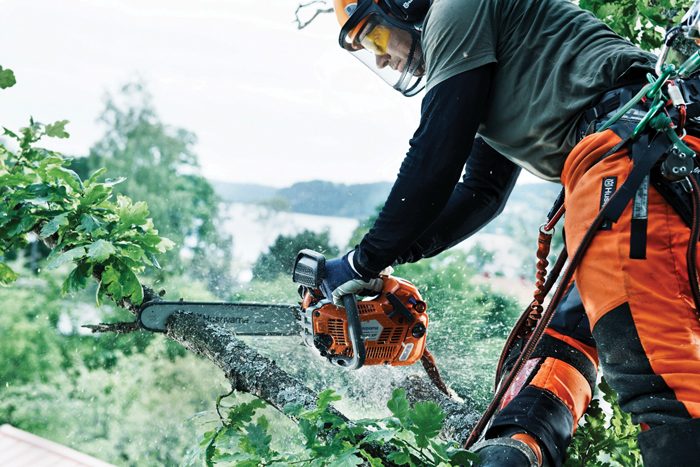




Post a comment
Report Abusive Comment